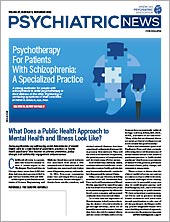Older patients have borne the brunt of COVID-19 in terms of mortality and complications. Figures published by the Centers for Disease Control and Prevention in Preventing Chronic Disease in June suggest that patients aged 65 years and older account for 81% of deaths related to the virus. Now studies suggest that older patients who survive infection have a much higher risk of cognitive decline than their peers who do not get COVID-19.
“We need to watch out over the long term,” said Rong Xu, Ph.D., a professor of biomedical informatics and the director of the Center for AI in Drug Discovery at Case Western Reserve University School of Medicine. “Research can help us understand which populations are most susceptible to the neuropsychiatric impact of COVID, but we also need to think of how we’re going to treat those long-term effects.”
Xu is a co-author of a report published in the Journal of Alzheimer’s Disease in September that found a link between COVID-19 and an increased risk of Alzheimer’s disease in older patients. She and her colleagues examined data from the electronic health records of over 6.2 million adults aged 65 years or older who had medical encounters between February 2020 and May 2021 and did not have a diagnosis of Alzheimer’s. Among all participants, 410,748 adults contracted COVID-19 during that time frame.
When the researchers revisited the patients’ health records a year later, they found that patients who had contracted the virus had a 69% greater risk of developing Alzheimer’s within a year of infection compared with those who did not contract the virus. Women had an 82% higher risk, and men had a 50% higher risk. Furthermore, survivors aged 85 years or older had an 89% increase in risk.
“We expected to see some increase in risk, but were surprised to see such a big difference in one year because we know that Alzheimer’s takes a long time to develop,” Xu told Psychiatric News. She added that bacterial and viral infections and inflammation have long been thought to contribute to the development of Alzheimer’s.
Another study, published in JAMA Neurology in March, implicates COVID-19 in raising the risk of cognitive decline among survivors. Yan-Jiang Wang, M.D., Ph.D., a professor and director of the Department of Neurology and Center for Clinical Neuroscience at Daping Hospital in Chongqing, China, and colleagues analyzed data from 1,438 COVID-19 survivors 60 years and older who were discharged from three COVID-19–designated hospitals in Wuhan, China, from February 10 to April 10, 2020. The survivors included 260 patients who had severe illness (for example, they experienced severe respiratory distress) and 1,178 who had nonsevere illness. The researchers also recruited 438 uninfected spouses of infected patients as a control group. The researchers assessed all study participants for cognitive changes at six months and again at 12 months.
Compared with the control group, patients who had severe COVID-19 had 4.87 times the odds of early onset cognitive decline, defined as cognitive changes that occurred within six months of hospital discharge. They also had 7.58 times the odds of late-onset cognitive decline, defined as changes that occurred between the sixth and twelfth month after discharge. Overall, 41.15% of patients who survived severe COVID-19 experienced cognitive decline within a year of discharge.
Higher risk was not confined to patients who had severe COVID-19, however. Patients who had nonsevere COVID-19 had 1.71 times the odds of early onset cognitive decline compared with the control group. The incidence of cognitive impairment among all survivors 12 months after discharge was 12.45%.
Wang noted that many of the patients in the study had conditions that place them at high risk of complications of COVID-19.
“In our study, the risk factors include hypertension, history of stroke and coronary heart disease, and chronic obstructive pulmonary disease [COPD], suggesting that vascular events and chronic hypoxia in the brain would be the reasons for long-term cognitive decline,” he said.
A third study, published online in
The Lancet Psychiatry in August, found that the risk of developing not only cognitive deficits and dementia, but also psychiatric disorders remains elevated for two years after a diagnosis of COVID-19 (
COVID-19 Increases Risk of Psychiatric Disorders).
Unraveling Mysteries
Several recent studies suggest that COVID-19’s link to cognitive decline may be multifaceted. A study published in Open Forum Infectious Diseases in March found that patients who had COVID-associated pneumonia had a 30% higher risk of developing new-onset dementia compared with those who had pneumonia unrelated to the virus.
Adnan Qureshi, M.D., a professor at Zeenat Qureshi Stroke Institute and the Department of Neurology at the University of Missouri, and colleagues examined the medical records of 20,806 patients throughout the United States who were diagnosed with pneumonia during a hospitalization lasting more than 24 hours. The patients had had at least four medical encounters within two years before their hospitalization and did not have a history of dementia. Half of the patients had pneumonia associated with COVID-19, and half had pneumonia that was not associated with COVID-19.
The researchers found that 3% of the patients in the COVID-19 group developed new-onset dementia, compared with 2.5% of those in the non-COVID-19 group, and the difference in new-onset dementia was most pronounced in patients aged 70 years and older. The median time to the development of new-onset dementia in the COVID-19 group was 182 days.
“The findings suggest a role for screening for cognitive deficits among survivors of SARS-CoV-2 infection,” Qureshi and colleagues wrote. “If there is evidence of impairment during screening that remains persistent and the patient continues to report cognitive symptoms, a referral for comprehensive neuropsychologic assessment may be necessary.”
A study published in Nature in March suggests that even mild infection with COVID-19 may cause changes in brain structure.
Gwenaëlle Douaud, Ph.D., an associate professor and research fellow at Green Templeton College at the University of Oxford, and colleagues investigated brain changes in 785 participants aged 51 to 81 years in the UK Biobank, an epidemiological study that contains in-depth genetic and health information from 500,000 participants in the United Kingdom. The participants had a baseline, pre-pandemic brain scan using magnetic resonance imaging between 2014 and 2020 and a second scan between February and May 2021. Upon enrollment, they also took a baseline UK Biobank Trail Making Test, which required them to draw lines between numbers or numbers and letters in ascending order as quickly and accurately as possible. Among all participants, 401 had COVID-19 between their two scans, whereas 384 did not.
A certain amount of gray matter loss occurs every year in most people because of aging. However, the COVID-19 group experienced a greater reduction in gray matter thickness in the orbitofrontal cortex, which is associated with the sense of smell, and the parahippocampal gyrus, which is associated with memory, between their two scans compared with participants in the non-COVID-19 group. On average, participants in the COVID-19 group had an additional 0.2% to 2% loss or tissue damage compared with those in the non-COVID-19 group. For example, participants in the COVID-19 group may have lost 2.9% of gray matter in a given brain region over the course of three years, while patients in the non-COVID-19 group will have lost only 0.9% over the same amount of time.
“To make sense of how big or small these effects are, it is worth putting them in the context of what happens with healthy aging, where it has been shown previously that each year people lose 0.2% to 0.3% of gray matter in regions related to memory,” said Douaud.
When the participants repeated the UK Biobank Trail Making test after their second brain scan, those in the COVID-19 group experienced a greater increase from baseline in the time taken to complete the test. These results corresponded to changes shown on the brain scans that suggested increased atrophy in crus II, an area of the cerebellum associated with cognition.
Douaud said that these brain changes might be partly related to loss of smell. “Repeated olfactory loss has been shown in previous studies to lead to loss of gray matter in brain regions related to olfaction,” Douaud said. “Unfortunately, we do not have information about the symptoms of the infected participants, including loss of smell.”
She added that the virus may also have a direct effect on cognition, either by invading the brain or causing inflammation or immune reactions, although it is unclear why these phenomena would be seen in some regions of the brain but not others.
Looking Ahead
The experts agree that COVID-19’s impact on cognitive function looms large as a societal threat.
“COVID-19 is no longer an acute disease. It’s a disabling disease,” Qureshi told Psychiatric News, noting that almost half of the population in the United States alone has had COVID-19. “How will society cope not only with the loss of productivity among these individuals, but with providing the care that they will require?”
Wang agreed, noting the potential impact across the globe.
“Given that the pandemic has affected 600 million people in the world so far and that number is still increasing, our findings imply that the COVID-19 pandemic will substantially increase the burden of dementia and cognitive decline, which is already high due to the population aging,” he said.
Wang emphasized the importance of well-rounded prevention, not only in protecting people against infection, but in managing the risk factors for cognitive decline and other complications of COVID-19, such as hypertension, stroke, coronary heart disease, and COPD.
Psychiatrists and other mental health professionals should follow up on the cognitive status of people who survive COVID-19, especially older people who had severe infection, Wang added. “Once cognitive decline is found, early interventions should be given with cognitive training and current available medications for dementia.” ■
Disclosure Statement
The study in Preventing Chronic Disease was supported by the Tufts Health Plan Foundation and the Gerontology Institute at the University of Massachusetts Boston.
The study in the Journal of Alzheimer’s Disease was supported by the National Institute on Aging, the National Institute on Alcohol Abuse and Alcoholism, the Clinical and Translational Science Collaborative of Cleveland, and the National Cancer Institute Case Comprehensive Cancer Center.
The study in JAMA Neurology was supported by the National Natural Science Foundation of China.
The study in The Lancet was supported by the National Institute for Health and Care Research Oxford Health Biomedical Research Centre, the Wolfson Foundation, and MQ Mental Health Research.
The study in Open Forum Infectious Diseases was supported by the National Institutes of Health.
The study in Nature was supported by the Wellcome Trust.



